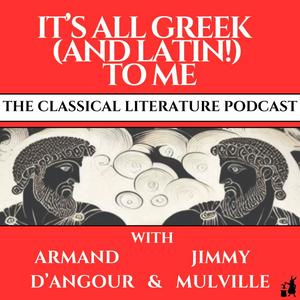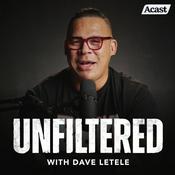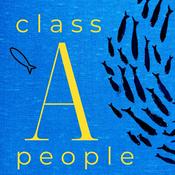21 episodes

The Vote To Save a City – The Deadly Mytilinean Debate with Paul Cartledge
08/7/2025 | 32 mins.
This week, Jimmy and Armand plunge into the tense world of ancient Athenian democracy, where the fate of an entire city hung on a single vote. The fierce Mytilene Debate showcased the incredible power of demagogues, the importance of the thin line between justice and vengeance and the undeniable power of ‘sleeping on it’… They also unpick the origins and intricacies of Ancient Athenian Democracy, ostracism by pottery shard, and how quoting Euripides might just save your life... Thank you to Professor Paul Cartledge for the suggestion for this week’s episode. The Main Text Explored was Thucydides’ History of the Peloponnesian War, Book III. Presented by Armand D’Angour and Jimmy Mulville Produced by Diggory Waite A Hat Trick Production For more on the charity Classics For All, who support state schools to introduce or develop the teaching of classical subjects sustainably on the curriculum or as an after school activity, visit www.classicsforall.org.uk

“The Old Lie” – The Roman Ode that Haunted the Trenches
01/7/2025 | 24 mins.
“Dulce et decorum est pro patria mori” – “It is sweet and glorious to die for one’s country.” This week, Jimmy and Armand dive into the conflicted world of Horace, the Roman poet who famously threw away his own shield, switched sides in a civil war and then wrote stirring verses urging young men to die for Rome’s new leadership. We explore Horace’s transformation from the carefree party bard many imagine, into a potential imperial propagandist; how Augustus used poetry to shape public feeling; and how this short Latin phrase – once used to promote war – would echo across the centuries, only to be picked up and shattered by Wilfred Owen in his devastating First World War poem. Also in this episode: a Roman consul who walks willingly to torture, Horace’s surprisingly cheeky thoughts on adultery, and how Yorkshire accents might just be the secret to perfect Latin pronunciation. Main texts explored: Horace – Odes, Book 3, Ode 2 (Angustam amice pauperiem pati) Contains the famous line: “Dulce et decorum est pro patria mori.” Horace – Odes, Book 1, Ode 37 (Cleopatra Ode) Horace – Odes, Book 3, Odes 1–6 (The “Roman Odes”) Explored generally. Horace – Odes, Book 3, Ode 7 (Ode on Adultery) Wilfred Owen – “Dulce et Decorum Est” Cavafy – “Thermopylae” (modern poem) Horace – Odes, Book 3, Ode 5 (Regulus Ode) Presented by Armand D’Angour and Jimmy Mulville Produced by Diggory Waite A Hat Trick Production For more on the charity Classics For All, who support state schools to introduce or develop the teaching of classical subjects sustainably on the curriculum or as an after school activity, visit www.classicsforall.org.uk

The Father of History or the Father of Lies? Herodotus' Histories with Han Parker
24/6/2025 | 24 mins.
Was Herodotus the Father of History — or the Father of Lies? Jimmy and Armand dive into the strange and spectacular world of Herodotus — a world filled with fox-sized, gold-digging ants, Pharaohs running brutal language experiments on babies and cultures who’d never dream of burning their dead… but would happily eat them. They explore how Herodotus crafted his Histories, why later Greek historians threw serious shade at his methods, and how someone with more in common with a travel vlogger or Victorian explorer than a modern academic came to shape our understanding of history itself. Main texts explored: Histories, Herodotus Presented by Armand D’Angour and Jimmy Mulville Produced by Diggory Waite A Hat Trick Production For more on the charity Classics For All, who support state schools to introduce or develop the teaching of classical subjects sustainably on the curriculum or as an after school activity, visit www.classicsforall.org.uk

Gods, Frogs and The Ancient Greek Elvis – The Music of Ancient Greece
17/6/2025 | 28 mins.
He gyrated, he pouted, he played two pipes at once – and he may have been the Elvis of ancient Greece... This week, Jimmy and Armand plunge into the strange, stirring soundscape of the classical world, where music wasn’t background – it was everything. We meet professional pipers who whipped crowds into frenzies, women whose musical talent could buy them out of slavery, and frogs who sang in rhythmic unison to torment a god. From breath-defying performance techniques to the eerie beauty of melodies reconstructed from scraps of papyrus, this is a world where language and pitch were inseparable – and where the past can still sing. The music heard (in order) was: ‘Improvisation on the Lourve Aulos’ performed by Callum Armstrong. 'The Frog Chorus' from ‘The Frogs’ by Aristophanes performed by Callum Armstrong. ‘Pindar's 12th Pythian Ode’ performed by Stef Conner and Barnaby Brown. ‘Euripides Orestes’ performed by a mixed choir and Barnaby Brown on the Aulos. A big thank you to all the performers. Presented by Armand D’Angour and Jimmy Mulville Produced by Diggory Waite A Hat Trick Production For more on the charity Classics For All, who support state schools to introduce or develop the teaching of classical subjects sustainably on the curriculum or as an after school activity, visit www.classicsforall.org.uk

“They Make a Desert and Call It Peace” – Tacitus' Agricola
10/6/2025 | 22 mins.
“They make a desert and call it peace.” It’s one of the most brutal lines in ancient history – but was it ever actually spoken? Jimmy and Armand unpack the sharp, unsettling world of Roman historian Tacitus, who often slipped his most biting critiques of Ancient Rome into the mouths of her enemies. We explore the fine line between history and drama, how Roman speeches were crafted rather than recorded, and what that says about truth, narrative, and power. Also in this episode: collapsing assassination boats, Roman mothers who just won’t die, the surprising origin of the phrase “parting shot” (which isn’t actually ‘parting shot’ at all!) and why Chelmsford was once (sort of) the heart of the Roman Empire. The main texts explored were: Agricola, Tacitus Annals, Tacitus Histories, Tacitus Presented by Armand D’Angour and Jimmy Mulville Produced by Diggory Waite A Hat Trick Production For more on the charity Classics For All, who support state schools to introduce or develop the teaching of classical subjects sustainably on the curriculum or as an after school activity, visit www.classicsforall.org.uk
More Education podcasts
Trending Education podcasts
About It's All Greek (and Latin) To Me
Listen to It's All Greek (and Latin) To Me, The Rich Roll Podcast and many other podcasts from around the world with the radio.net app

Get the free radio.net app
- Stations and podcasts to bookmark
- Stream via Wi-Fi or Bluetooth
- Supports Carplay & Android Auto
- Many other app features
Get the free radio.net app
- Stations and podcasts to bookmark
- Stream via Wi-Fi or Bluetooth
- Supports Carplay & Android Auto
- Many other app features


It's All Greek (and Latin) To Me
download the app,
start listening.





































